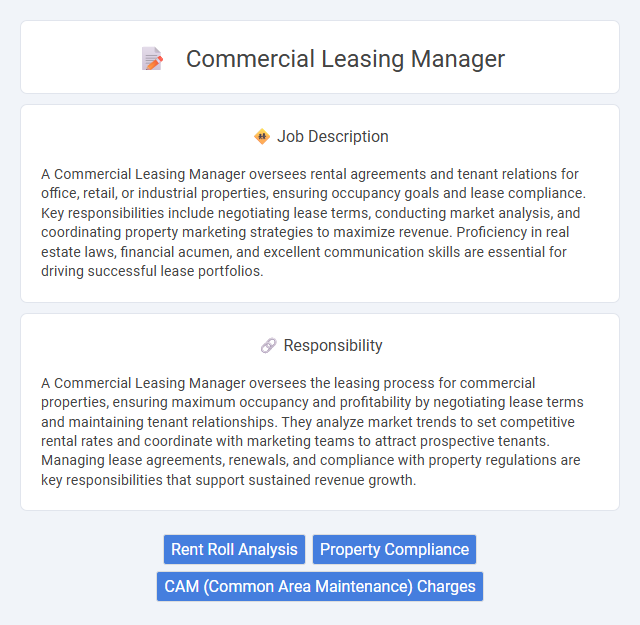
A Commercial Leasing Manager oversees rental agreements and tenant relations for office, retail, or industrial properties, ensuring occupancy goals and lease compliance. Key responsibilities include negotiating lease terms, conducting market analysis, and coordinating property marketing strategies to maximize revenue. Proficiency in real estate laws, financial acumen, and excellent communication skills are essential for driving successful lease portfolios.
Individuals who possess strong interpersonal skills and a knack for negotiation are likely well-suited for a commercial leasing manager role. Candidates with a background in real estate, finance, or property management may find it easier to handle the responsibilities that involve complex contract discussions and tenant relations. Those who thrive under pressure, enjoy problem-solving, and have a detail-oriented mindset could probably succeed in managing leases and maintaining commercial property occupancy efficiently.
Qualification
A Commercial Leasing Manager requires a strong background in property management, real estate law, and tenant relations to effectively manage lease negotiations and contract compliance. Proven expertise in market analysis, financial acumen, and excellent communication skills are essential to maximize occupancy rates and rental income. A bachelor's degree in real estate, business administration, or finance is typically preferred, along with relevant certifications such as Certified Property Manager (CPM) or Real Estate License.
Responsibility
A Commercial Leasing Manager oversees the leasing process for commercial properties, ensuring maximum occupancy and profitability by negotiating lease terms and maintaining tenant relationships. They analyze market trends to set competitive rental rates and coordinate with marketing teams to attract prospective tenants. Managing lease agreements, renewals, and compliance with property regulations are key responsibilities that support sustained revenue growth.
Benefit
Commercial leasing managers likely enjoy benefits such as competitive salaries, performance-based bonuses, and opportunities for career advancement. Health insurance, retirement plans, and paid time off may also be standard perks that enhance job satisfaction. Access to networking events and industry resources might further support their professional growth and success.
Challenge
Managing commercial leasing can present challenges related to balancing tenant satisfaction with maximizing property revenue. Navigating complex lease agreements and ensuring compliance with evolving regulations may require careful attention and negotiation skills. The probability of encountering unpredictable market conditions also adds an ongoing layer of uncertainty to this role.
Career Advancement
A Commercial Leasing Manager oversees property leasing operations, negotiates contracts, and maintains tenant relationships to maximize occupancy and revenue. Career advancement opportunities include progressing to senior property manager, leasing director, or real estate asset manager roles, often requiring expertise in market analysis, financial modeling, and strategic planning. Developing strong negotiation skills and a deep understanding of commercial real estate trends enhances prospects for leadership positions within property management firms or real estate investment companies.
Key Terms
Rent Roll Analysis
A Commercial Leasing Manager specializing in Rent Roll Analysis expertly evaluates tenant rent payments, lease terms, and occupancy rates to optimize property revenue. Accurate rent roll analysis identifies lease expirations, rent escalations, and vacancy trends, enabling proactive leasing strategies. Deep understanding of lease agreements and financial metrics enhances portfolio performance and supports informed decision-making.
Property Compliance
A Commercial Leasing Manager ensures strict adherence to property compliance regulations, including zoning laws, safety codes, and environmental standards. They coordinate with legal teams and property inspectors to maintain compliance documentation and address any violations promptly. Effective management of lease agreements guarantees that all tenant activities align with local and federal property compliance requirements.
CAM (Common Area Maintenance) Charges
A Commercial Leasing Manager is responsible for negotiating and managing Common Area Maintenance (CAM) charges, ensuring accurate allocation and transparency in billing to tenants. Effective CAM charge management involves detailed analysis of shared property expenses, including security, landscaping, and maintenance, to optimize cost recovery while maintaining tenant satisfaction. Mastery of lease agreements and regulatory compliance ensures CAM charges are enforced fairly and reflect actual operational costs.
 kuljobs.com
kuljobs.com